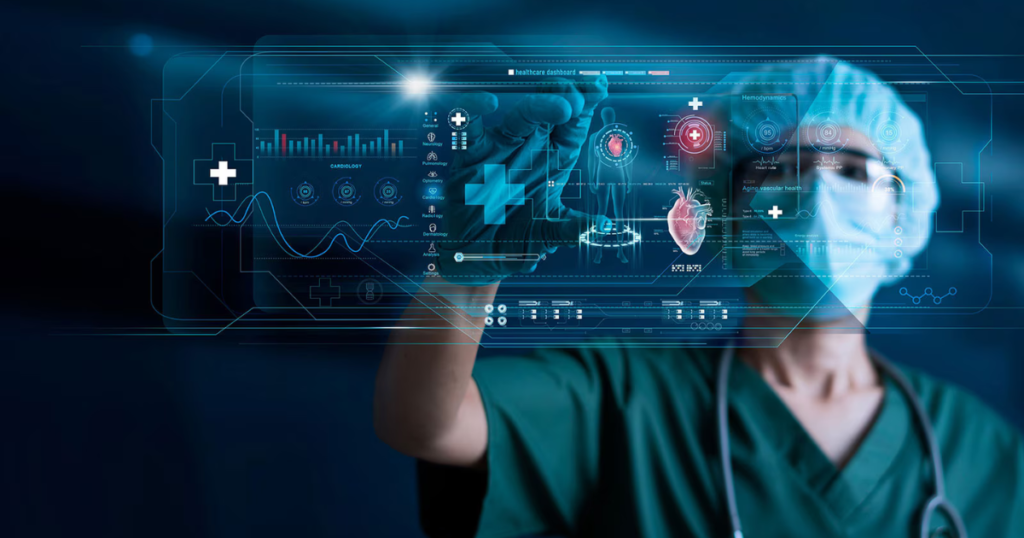AI Powered Healthcare Analyst is revolutionizing industries across the globe, and healthcare is no exception. AI-powered healthcare analysts play a vital role in transforming medical data into actionable insights, improving patient outcomes, and optimizing hospital operations. As AI continues to evolve, the demand for professionals who can bridge the gap between technology and healthcare grows.
This article explores the role of an AI-powered healthcare analyst, their responsibilities, skills required, and the impact they have on modern healthcare.
What Is an AI Powered Healthcare Analyst ?
An AI-powered healthcare analyst is a specialist who uses AI-driven tools and data analytics to assess medical trends, enhance patient care, and improve operational efficiency in healthcare settings. They work with hospitals, pharmaceutical companies, insurance providers, and healthcare technology firms to optimize decision-making through AI-driven insights.
Key Responsibilities : AI Ethics Consultant Jobs
AI-powered healthcare analysts are responsible for a variety of tasks, including:
- Data Collection and Analysis – Gathering and analyzing vast amounts of medical data from electronic health records (EHRs), clinical trials, and wearable devices.
- Predictive Analytics – Using AI models to forecast patient health risks and disease outbreaks.
- Optimizing Hospital Operations – Enhancing efficiency in resource allocation, scheduling, and administrative processes.
- Improving Patient Outcomes – Assisting doctors in diagnosing diseases and recommending personalized treatment plans based on AI-generated insights.
- Ensuring Compliance and Data Privacy – Ensuring AI applications adhere to healthcare regulations such as HIPAA and GDPR.
- AI Model Development and Implementation – Collaborating with data scientists and engineers to refine AI models for healthcare applications.
Importance of AI-Powered Healthcare Analysts
1. Enhancing Diagnostics and Early Detection
AI-powered analysts assist in the early detection of diseases such as cancer, diabetes, and cardiovascular conditions by analyzing medical imaging, genetic data, and patient history.
2. Reducing Healthcare Costs
By streamlining operations and improving efficiency, AI-powered healthcare analysts help hospitals and insurance companies reduce unnecessary expenses and improve patient care.
3. Personalized Treatment Plans

AI enables healthcare providers to create personalized treatment plans based on individual patient data, leading to better outcomes and reduced adverse reactions.
4. Improving Drug Development
AI-powered analysts contribute to pharmaceutical research by analyzing clinical trial data, predicting drug efficacy, and accelerating the drug discovery process.
5. Enhancing Healthcare Accessibility
Through AI-driven telemedicine and remote monitoring solutions, analysts help expand healthcare access to underserved populations and improve patient engagement.
Skills Required to Become an AI-Powered Healthcare Analyst
1. Data Science and AI Knowledge
Understanding AI, machine learning, and big data analytics is essential for analyzing complex medical datasets.
2. Healthcare Domain Expertise
Familiarity with medical terminology, healthcare regulations, and industry-specific challenges is crucial for accurate analysis and ethical AI deployment.
3. Statistical and Analytical Skills
Strong statistical and analytical skills are required to interpret AI-driven insights and make data-backed recommendations.
4. Programming Proficiency
Knowledge of programming languages such as Python, R, and SQL is beneficial for working with AI algorithms and healthcare datasets.
5. Communication and Problem-Solving Skills
AI-powered healthcare analysts must effectively communicate findings to medical professionals, policymakers, and stakeholders while addressing complex healthcare challenges.
How to Become an AI-Powered Healthcare Analyst
1. Educational Background

A strong educational foundation in the following fields can help build a career as an AI-powered healthcare analyst:
- Data Science
- Artificial Intelligence and Machine Learning
- Healthcare Informatics
- Biomedical Engineering
- Public Health and Epidemiology
2. Gaining Experience in Healthcare Analytics
Hands-on experience through internships, research projects, and industry collaborations can help professionals develop expertise in AI-powered healthcare analytics.
3. Earning Certifications
Certifications in AI, healthcare data analytics, and machine learning can enhance career prospects. Some recommended certifications include:
- Certified Health Data Analyst (CHDA)
- Stanford AI in Healthcare Certification
- IBM Data Science and AI Certification
4. Staying Updated with Industry Trends
Healthcare and AI are rapidly evolving fields. Analysts should stay updated with the latest advancements in AI-driven healthcare solutions through conferences, research papers, and online courses.
The Future of AI-Powered Healthcare Analysts
The demand for AI-powered healthcare analysts is expected to rise as AI technologies become more integrated into medical practices. Future trends may include:
- Greater Adoption of AI in Medical Imaging – AI-driven diagnostic tools for X-rays, MRIs, and CT scans will continue to improve accuracy and efficiency.
- Expansion of AI in Remote Patient Monitoring – AI will enhance telehealth services, enabling real-time health tracking and predictive analytics.
- Advancements in AI-Powered Drug Discovery – AI will further revolutionize pharmaceutical research, reducing the time and cost of developing new drugs.
- Increased Focus on AI Ethics and Regulations – AI-powered healthcare analysts will play a crucial role in ensuring compliance with evolving healthcare laws and ethical guidelines.
Also Read: What Are AI Ethics Consultant Jobs And Why Are They Important?
Conclusion
AI-powered healthcare analysts are instrumental in transforming the healthcare industry through data-driven insights, predictive analytics, and AI-powered solutions. By enhancing diagnostics, optimizing hospital operations, and improving patient care, they contribute to more efficient and effective healthcare systems. As AI technology continues to evolve, the role of AI-powered healthcare analysts will become even more critical in shaping the future of medicine.
FAQs
1. What industries hire AI-powered healthcare analysts?
AI-powered healthcare analysts work in hospitals, pharmaceutical companies, insurance firms, healthcare technology startups, and government agencies.
2. Do AI-powered healthcare analysts need a medical degree?
No, a medical degree is not required, but a strong understanding of healthcare data, AI technologies, and medical terminology is essential.
3. How much does an AI-powered healthcare analyst earn?
Salaries vary based on experience and location, but AI-powered healthcare analysts typically earn between $80,000 and $150,000 per year.
4. What are the biggest challenges AI-powered healthcare analysts face?
Challenges include ensuring data privacy, eliminating AI bias, integrating AI into traditional healthcare systems, and maintaining regulatory compliance.
5. Can AI-powered healthcare analysts work remotely?
Yes, many analysts work remotely, particularly those involved in AI model development, data analytics, and telehealth solutions.



